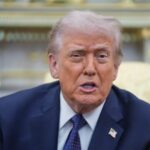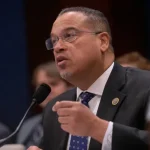Former President Donald Trump is digging deep into the history books for guidance on tariffs, which have become one of his favorite topics on the campaign trail.
Trump says tariff is his favorite word in the dictionary, and he regularly praises a man he calls “the tariff king,” 25th President William McKinley.
“[McKinley’s] language was really beautiful,” Trump said on Joe Rogan’s podcast. “’We will not allow the enemy to come in and take our jobs and take our factories and take our workers and take our families unless they pay a big price. And the big price is tariffs.’ And he’d speak like that. But he was right.”
But whether McKinley was right, and if his approach to tariffs can be emulated in the 21st century, remains up for debate, and could be a major topic of controversy should Trump win the 2024 election.
Tariffs are a tax on imported goods implemented by the government, which serve two purposes. One is to raise revenue for the government, and the other is to protect domestic industry from foreign competition, especially if that competition is thought to be unfair or ethically compromised.
One thing that’s not up for debate is that Republicans, known today as the party of free trade, were an aggressively pro-tariff political party from the GOP’s founding in the 1850s through the early 1930s. Abraham Lincoln was a tariff man during his presidency in the Civil War, and import tariff rates often hovered around 40% in the postwar decades.
“My politics are short and sweet, like the old woman’s dance,” Lincoln once said. “I am in favor of a national bank … and a high protective tariff.”
The Republican tariff movement grew throughout the late 1800s and arguably peaked with McKinley, Trump’s tariff icon, in the 1890s. As an Ohio congressman who chaired the House Ways and Means Committee, McKinley helped pass what became known as the McKinley Tariff, raising the average duty on imports to almost 50%.
Trump, if elected, has called for across-the-board tariffs of up to 20%, which seem almost quaint in comparison.
But the story is not that simple. McKinley was swept out of Congress due in part to blowback from the high tariffs. He then made a comeback by winning two races for Ohio governor and, in 1896, the presidency amid an economic downturn.
“McKinley was a tariff man, no question about it,” said Washington state-based journalist and publishing executive Robert W. Merry, who authored a book about McKinley. “His great mentor, [President Rutherford B. Hayes], told him to focus on one issue, and he picked tariffs.”
As president, McKinley helped pass the 1897 Dingley Tariff, which imposed duty rates averaging 52% in its first year. The U.S. economy grew rapidly afterward, and he won a second term in 1900.
Was McKinley the tariff king that Trump speaks about? Not quite. Entering his second term, McKinley began to believe the United States had become so strong economically that it could benefit from increased exports. He started promoting the concept of reciprocity, matching tariffs to those of other countries and lowering them when possible.
“Isolation is no longer possible or desirable,” McKinley said in a speech at the Pan-American Exposition in Buffalo on Sept. 5, 1901. He held that the U.S. could no longer promote the “fancied security that we can forever sell everything and buy little or nothing,” and pushed for a stronger export trade.
It proved to be the last speech of McKinley’s life. He was shot by an assassin the following afternoon and died eight days later, leaving his legacy as a president and a tariff man incomplete.
For Trump 120 years later, the appeal to tariffs is strongest among the blue-collar Rust Belt voters he’s trying to win in battleground Pennsylvania, Michigan, and Wisconsin. He blames deals like the 1994 North American Free Trade Agreement for wrecking large portions of the Midwest with outsourcing that led to shuttered factories. Trump’s pick of Sen. J.D. Vance (R-OH), who grew up poor in Ohio, as his running mate is another homage to that appeal.
On the campaign trail, Trump likes to tell the story of warning China against building electric vehicles in Mexico by threatening tariffs and has promised to sign the “Trump Reciprocal Trade Act” to match the tariffs of other countries.
Trump’s pro-tariff, trade-limiting stance doesn’t fold neatly into existing ideological lines. David Madland, an economist at the Center for American Progress, said he agrees that tariffs can be part of an effective strategy to protect emerging industries, though he doesn’t favor them to the extent that Trump does.
Madland also agrees with some criticisms of free trade deals like NAFTA, such as charges that they help companies skirt U.S. wage laws and environmental regulations, even if he’s not a fan of Trump’s approach overall.
“Trump has some pieces of the story right,” Madland said. “But going back to the 1890s is a strange way to deal with modern economic challenges.”
Conservative economist Stephen Moore, on the other hand, is fine with NAFTA and argues that any hollowing out of Rust Belt manufacturing is due to entrenched labor unions that led companies to move operations to southern states.
Moore is on board for higher tariffs — if they’re coupled with lower income taxes, which have largely supplanted import duties as a way to fund the government since the 16th Amendment was ratified in 1913.
“If conservatives are serious about pushing this idea, we will be right behind them,” he wrote. “Taxing consumption is smarter than taxing income. The plan would be a gigantic vacuum cleaner sucking up capital from across the world.”
Trump teased such a plan when speaking to Rogan. When the podcast host asked if Trump was floating the idea of replacing income taxes with tariffs, Trump answered, “Sure, why not?”
Trump’s critics often say his plans are economically illiterate, but they cannot call him inconsistent. He’s been pushing foreign import duties for decades, saying the U.S.’s trading partners are ripping it off. He took out full-page newspaper ads in 1988 reading, “There’s nothing wrong with America’s foreign defense policy that a little backbone can’t cure.”
“We let Japan come in and dump everything right into our markets,” he told Oprah the same year. “It’s not free trade. If you ever go to Japan right now and try to sell something — forget about it Oprah, just forget about it. It’s almost impossible. They don’t have laws against it, they just make it impossible.”
He proposed making Japan accept more American products and having Kuwait pay 25% duties on oil imports.
“I think people are tired of seeing the United States ripped off,” he added, teasing a presidential run. “I can’t promise you everything, but I can tell you one thing — this country would make one hell of a lot of money from those people that for 25 years have taken advantage of us.”
Almost four decades later, Trump made a similar argument when speaking to Rogan.
Rather than Japan, Trump attacked China for refusing to accept U.S. cars while selling their cars to Americans. He proposed a tariff of 200% or higher to keep Chinese cars out of the country. Instead, Trump says, the cars would have to be built at domestic factories.
Trump also said Taiwan “stole” the U.S. computer chip business, and argued that it could be rebuilt simply by imposing a tariff, lambasting efforts like President Joe Biden’s $280 billion CHIPS and Science Act. He even claimed to have prevented wars through the use of tariffs.
“To me, the most beautiful word … in the dictionary today and any day is the word ‘tariff,’” Trump told Rogan. “It’s more beautiful than love. It’s more beautiful than anything. It’s the most beautiful word.”
What Trump’s critics warn about is the downside of tariffs and the reasons they mostly fell out of favor in the late 20th century.
Republicans infamously passed the Smoot-Hawley Tariff Act in 1930, which implemented some of the highest import levies in U.S. history. The act was credited with exacerbating the Great Depression and led to the rise of Franklin Delano Roosevelt and a generation of Democratic Party dominance.
The GOP returned to strength in the late 20th century by becoming the party of free trade, as promoted by the Ronald Reagan administration and free market economists like Milton Friedman
“The lesson of Smoot-Hawley was that tariffs can be devastating to international trade, and therefore to the economies of countries trying to engage in international trade,” Merry said. “You can talk about McKinley, but you can’t leave out Smoot and Hawley and Herbert Hoover. It’s a delicate situation and you can’t get too ham-handed about it.”
Moore, the Heritage Foundation economist, agrees.
“You have to worry about retaliation from other countries,” he said. “The Smoot-Hawley tariffs were the match that lit the fire of the Great Depression. It basically shut down the global trading system. You don’t want to see a massive trade war that would slow down the economy. Of course, Trump would say we’re already in a trade war, we’re just not fighting.”
CLICK HERE TO READ MORE FROM THE WASHINGTON EXAMINER
Trump passed only limited tariffs during his first term, such as duties on Chinese steel that Biden kept in place after taking office. But he’s promising to go much bigger in a second term, saying the U.S. was at its strongest during the days of McKinley in the 1890s.
“We were so rich. We had so much money. We didn’t know what to do,” Trump told Rogan. “So they set up a blue ribbon commission on tariffs. And the sole purpose is what to do with all the money we had. We were so rich because we were taxing other people for coming in and taking our jobs.”




